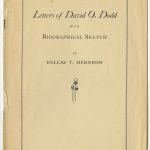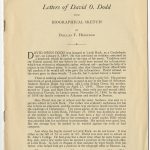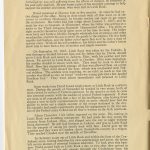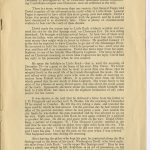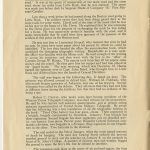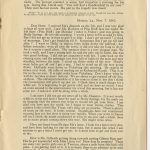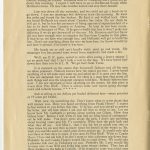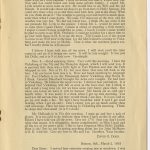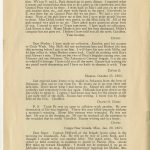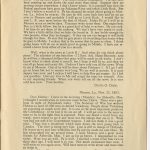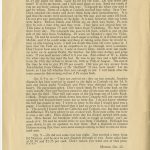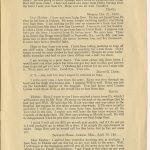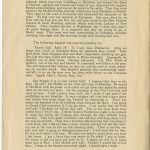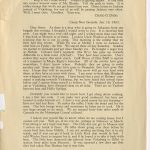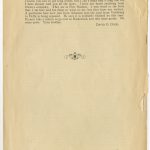Click here for this soldier’s biography:
https://micivilwar.com/authors/dodd-david-o/
Regiment:
Battles Mentioned: Perryville, Kentucky; Vicksburg, Mississippi
Historical Figures: Albert G. Blanchard, Braxton Bragg, Don C. Buell, Frederick Steele, George B. McClellan, James F. Fagan, John C. Pemberton, Nathaniel P. Banks, Sterling Price, Theophilus H. Holmes, Thomas J. “Stonewall” Jackson
Letters of David O. Dodd
with
Biographical Sketch
By
Dallas T. Herndon
Letters of David O. Dodd
with
Biographical Sketch
By
Dallas T. Herndon
David Owen Dodd was hanged at Little Rock, as a Confederate
spy, on January 8, 1864. He was convicted on evidence contained in
a notebook which he carried at the time of his arrest. Tradition says
the Federal general did not believe he could have secured the information,
which was written in telegraphic cipher, without aid – perhaps the help of a
traitor in the Federal army. It is said, also, that General Steele offered him
full pardon if he would tell who gave the information. David refused, so
the story goes, in these words: “I can die, but I cannot betray a friend.”
There is nothing unusual to tell about the boy’s early life. His parents
were born of good pioneer families, as good as any in the State of Arkansas.
Andrew Marion Dodd, his father, and Lydia Echols Owen, his mother
were married at Collegeville on April 27, 1843. Three years later they
moved to Texas, and there David Owen, their only son and second child,
was born at Victoria, in Lavaca county, November 10, 1846. In the spring
of 1858 the family returned to Arkansas and settled in Benton.
Here David was put at school and his sister, Senhora, was sent to a
private school in Little Rock. The father was evidently ambitious for his
son to have an education, and his mother was careful to instill into his mind
the teachings of Christianity. The pious advice of his sister in her letter to
David, written in Little Rock, February 25, 1860, was doubtless an echo
of the mother’s teachings. He must have been a boy of fairly studious
habits, for his sister still has in her possession a small pocket Bible which
was awarded him for excellence in penmanship. His morals were good, but,
like the average boy, he needed to be warned against the evils of bad
company.
Just when the family moved to Little Rock, we do not know. It was
either in the fall of ’61 or early in ’62. David was now sent to school at
St. John’s College. He had gone but s short time when he came home on
day, sick, and a few weeks later he secured a position in the telegraph office
at Little Rock. In July or August of that summer he went South with his
father, who helped him get a position in the telegraph office at Monroe, La.
The position was a responsible one for a sixteen-year-old boy. Tele-
graph lines in that section had been pressed into government service by the
[3]
Confederacy, and his letters to his mother from September to January fol-
lowing indicate that many important dispatches passed through his hands.
Although he was still suffering from the effects of malaria, he remained at
his post early and late. He sent home a part of his monthly earnings to help
support his mother and sisters, who were still in Little Rock.
David remained at Monroe four or five months. At times he had en-
tire charge of the office. Being in close tough with all that went on in the
armies in Northern Mississippi, he became restless and eager to get nearer
the excitement. His father had him resign about January 1, 1863, and he
made his way to Granada, in Mississippi, where his father was serving as a
sutler to the Third Arkansas Regiment (dismounted rifles). For sever or
eight months thereafter David spent most of his time in camp. His father
went back and forth to Mobile, brought wholesale lots of tobacco and other
merchandise, and left his son to retail the goods to the soldiers. He was both
capable and fearless, and the father relied upon him as if he were a man of
mature years. With all his self-confidence, his letters and his father’s letters
show him to have been a boy of modest and simple manners.
On September 10. 1863, Little Rock was taken by the Federals. It
was thereupon decided between him and his father the he, David, should
go to Little Rock and return to Jackson, Miss., with his mother and two
sisters. He arrived in Little Rock early in October. After some hesitation,
his mother decided to return with him. They went by train to DeVall’s
Bluff. Here they engaged deck passage, all that was allowed them, on a river
transport. They went aboard the boat, which was overloaded with Fed-
eral soldiers. The soldiers were insulting, we are told; so much so that the
mother was afraid to stay on board “with two your girls and a hot-headed
Southern boy.” They went ashore immediately and returned to Little
Rock.
Some weeks later David found employment at Little Rock in a sutler’s
store. During the month of November he worked in two stores, both of
them owned by sutlers of Federal regiments. In the capacity as clerk he came
into personal contact with the soldiers of several Federal regiments. It does
not seem at all remarkable that a boy of his intelligence, after having lived
almost a year in daily communication with an army, should have had the
ability to write out a simple account of the troops stationed in the city.
He certainly had ample opportunity during his engagements to the two sut-
lets of the Federal army to find out all that is written in the little notebook.
About December 1 his father appeared on the scene. His coming to
Little Rock was doubtless unexpected. He had made his way across the
country from Jackson, Miss., and slipped into the city at night without
being discovered. He still had business in Jackson, and was in Little Rock
for the purpose of taking his family back with him. David gave up his
position and they went to Camden; drove through the country in a wagon.
They reached Camden near the middle of December.
In the hurry to get out of Little Rock and within the lines of the Con-
federate army, fearing doubtless his own apprehension and arrest, the father
left certain matters of personal business unsettled. To look after this busi-
ness, David started back to Little Rock a day or two after they arrived in
Camden. To ensure his safe passage through the Confederate lines, his
father went with him to Confederate headquarters in or near Camden. Here
they met General Fagan, and had no difficulty in getting a pass. As a further
[4]
precaution, his father gave him a birth certificate, which showed him to be
under age for military duty. This certificate, several letters and a pass, dated
December 22 and signed by W. A. Crawford, lieutenant colonel command-
ing Confederate-outpost near Princeton, were all exhibited at the trial.
There is a story, with more than one version, that General Fagan told
David to gather all the information he could while in Little Rock. General
Fagan is reported to have called this story gossip, pure and simple. David’s
father was present during the interview with the general, and he is said to
have denounced it as absolutely false. There is plenty of circumstantial
evidence to bear out the truth of these denials.
David made the return trip to Little Rock without accident and en-
tered the city by the Hot Springs road, on Christmas Eve. He was riding
horseback. He brought with him several letters. At least two of them were
from his father, who advised his correspondents to send him any Confed-
erate money they might wish to invest in tobacco. He specified January 13
as the day he expected to leave Camden to go east of the Mississippi River.
He promised to hold the tobacco, which he proposed to buy, until after the
war, and then sell it on commission. David also had a letter from his sister,
Senhora, to one of her friends, Miss Minerva Cogburn. The letter he deliv-
ered on Christmas morning, so wrote Miss Cogburn in her reply. David had
her reply in his possession when he was arrested.
He spent the holidays in Little Rock – that is, until the morning of
December 29 – as a guest at the home of his aunt, Mrs. Owen. We know
from Miss Cogburn’s letter that he went to more than one dance, that he
mingled freely in the social life of his friends throughout the week. He met
and talked with young girls, some who were in the habit of receiveing at-
tention from Federal army officers. It is perfectly clear from the letters
which passed that he saw much of Miss Cogburn. She wrote freely to his
sister of her pleasure at seeing David again, and also about the social gossip
of the town. Apparently she knew about the business which brought him
back to Little Rock, but there is not the slightest intimation of any other
motive for his return.
It was shown at the trial that he delivered a letter from his father to
I. D. Fitzgerald and another to E. B. Blanks. On the morning of December
29 he started to Camden. He left the city riding a mule, and traveled the
same road by which he had entered. On the previous day he had visited the
office of the provost marshal, where he was given a pass. Just outside the
city limits he was halted, his pass examined and he was allowed to go on
his way. Eight miles from Little Rock he was again ordered by a sentinel
to produce his pass. He did so, and again went on his way. Daniel Older-
burg, a private of Company “E,” First Missouri Cavalry, testified at the
trial that he was the soldier on picket duty either miles from the city. the
witness said, in part: “I then told him he did not need a pass any more,
and I kept his pass. I tore up the pass on the post when I was relieved.”
This happened some time during the morning.
After leaving the picket who kept his pass, he continued along the Hot
Springs road to the home of his uncle, Washington Dodd, who lived eight-
een miles from Little Rock, “on the upper Hot Springs road.” Here he was
given a pistol, one which he left, doubtless, as an act of precaution, on his
way to the city. In the afternoon he turned back and retraced his steps
along the Hot Springs road to a point not more than a mile or two from the
[5]
place where the picket had taken up his pass in the morning. Here he turned
into a cross road, which ran in a southeasterly direction. The cross road
intersected another road, which was designated at the trial as “the Benton
road.” It was at the point of intersection of the main road and the cross
road, about ten miles from Little Rock, that he was arrested. The arrest
was made just before dark by Sergeant Miehr of Company “B,” First Mis-
souri Cavalry.
Less than a week before he had passed along the Benton road going to
Little Rock. The soldiers swore they had been doing guard duty at the
cross roads for some weeks. David said at the time of his arrest that he was
on his way to the house of a Mr. Davis. He explained that he was returning
to the Davis place for the purpose of exchanging the mule he was riding
for a horse. He was apparently perfectly familiar with the road, and it
seems improbable that he could have been ignorant of the presence of the
soldiers at this point on the Benton road.
He was send first to Lieutenant Stopral, who insisted that since he had
no pass, he must have some paper about his person by which he could be
identified. The boy then handed the officer his memorandum book, which
contained the damaging telegraphic writing. Remarkable as it may seem.
the officer was familiar with the Morse code. He read enough of the writing
to arouse his suspicion, and then went with the boy to the “office” of
Captain George W. Hanna. The captain took from him all his papers, some
money and the pistol. He then gave him his supper and had him placed in
the “guard house.” The next morning, which was December 30, Hanna
turned the prisoner over to Capt. John Baird, who brought him to Little
Rock and delivered him into the hands of General Davidson.
The trial was begun on the following day. It lasted six days. The
prisoner was allowed counsel to defend him. William M. Fishback, who
afterwards became governor of Arkansas, was one of his lawyers. Several
witnesses were called by the defense. They all swore that they had seen him
at different times during the holidays, but that they had no evidence of his
being a spy.
Robert C. Clowry, who many years later became president of the
Western Union Telegraph Company, was chief witness for the prosecution.
He said he was captain and assistant quartermaster, and at present acting
assistant superintendent of United States Military Telegraph. He swore
that the following was true translation of all the telegraphic writing in
the book: “Third Ohio battery has four guns – brass. Three regiments in
a brigade, brigade commanded by Davidson. Infantry: First brigade has
three regiments; Second brigade has three regiments, one on detached serv-
ice; one battery, four pieces, Parrott guns; Brigadier General Solomon com-
mands a division, two brigades in a division: three regiments in one brigade,
two in the other. Two batteries in the division.”
The trial ended on the 5th of January, when the court passed sentence
of death by hanging. The next day General Steele ordered the provost
marshal general to carry out the sentence on January 8, on the grounds in
front of St. John’s College. A number of citizens, men and women, begged
the general to spare the boy’s life, but he refused to interfere.
The execution took place at the center of an enclosed square, the four
sides of the square being formed by armed soldiers standing in line, prob-
ably four battalions. At least one eyewitness, who was perhaps near enough
[6]
to hear ordinary conversation, gave this account of what happened after the
wagon in which the prisoner sat came to a stop under the gallows: He stood
up in the wagon, deliberate and calm. The attendants did their work hur-
riedly. The provost marshal, it seems, had forgotten a covering for his
eyes. Seeing this, David said, “You will find a handkerchief in my coat.”
These were his last words. His part in the tragedy was closed.
NOTE:- So far as it goes, this sketch is an impartial statement of facts. Enough has been told, perhaps
for the reader to form his own opinion of the justice or the injustice of the case.
Monroe, La., Nov. 7, 1862.
Dear Sister: I received Ma’s dispatch on the 5th, and I was very glad
to hear all were well. I saw Mr. Houston of Pine Bluff here last night. He
left there (Pine Bluff) last Monday (today is Friday) and was going to
Holly Springs. He left this morning. I wrote a letter to Pa to send by him.
But I did not get up in time to give it to him. I don’t get up until 7 o’clock
of mornings. Don’t get breakfast till 8. Sometimes don’t get up till half
after 7. I went to Delhi (a station forty miles down the railroad) day
before yesterday; went all over the town; it did not take me long to do it,
for it is quite a small place. The operator there is a very pleasant man. We
took a walk, and I saw a young lady, he said the only one in Delhi. She was
very good looking. I did not get acquainted with her. I came back on the
evening train, and the passenger cars were full of ladies in the seats and men
standing between the seats. I stood up thirty miles of the way. Finally
some ladies got off and I got a seat. I had to stand up all the way going
down. Hollands went down to Vicksburg this morning. He expects to
return next week. He talks of sending me to Richmond Roads. That is as
far as the cars run. It is eight miles from Vicksburg. Don’t know what he
will do, he takes so many notions. We are about to get rousted off the line,
anyhow. The old superintendent of it has come to claim it, but don’t think
the Government will give it up just yet. I think there is much danger for a
while yet. It is beginning to get pretty cold, and we have no wood. I sent
an order around to the quartermaster for a load this morning, but it has not
come yet. I reckon it will be along after a while.
I am sorry I did not get my letter off by Mr. Houston. It is not worth
while to write and send a letter by mail to Holly Springs, for the mails are
so irregular that the person you write to would not get your letter. I am
glad you have sent my trunk, for I began to want winter clothes. This
country looks a little like Texas, only there are no prairies. There is plenty
of moss on the trees. It looks natural. Steamboats have not commenced
running here yet, but river is rising very rapidly. When you write to Emma
tell her I think she might condescend to write to me once and a while, there
are so many people ocming down this way. She might write often.
Have not heard from Pa since Ma’s letter. I look for a letter every day,
and have been looking for one for some time, but it seems like when I am
anxious to get a letter I never get one. It is most time to get one from you
or ma.
How is Mr. Gilbrath getting along towards cutting Gibson Bass out?
Has he got acquainted with Miss Lizzie yet? How does he progress? There
are some very pretty girls over at Trenton, about a mile from this little old
place. I am getting tired of it, it is so dusty there is no pleasure to be seen
here at all. I enjoyed my trip to Delhi very well. This is a very lonesome
place. We only sent one message all day, but I got a novel and spent the
[7]
evening in reading while Mr. McDonough slept. He wanted me to go
down this morning and take charge of his office while he made a visit in the
country among his friends. Hollands went to Vicksburg and I could not go
down this morning. I expect I will have to go to Richmond Roads when
Holland returns. He may take another notion and stay there himself.
Line was down all day yesterday, and we could not get a hand car to
go down. I sent my messenger boy down on train this morning. He went
five miles and found the line broken. He fixed it and walked back. Have
not heard Hollands say much about Camden line today. Do not think he
will get it, but he has fine prospects of being appointed superintendent of a
line to be built from Camden to Arizona. At least he has been recom-
mended to Secretary of War. If he gets to build that line it won’t make any
difference if we do get thrown off of this one. Mr. Houston said that Snow
did not have enough wire to complete the line from Camden to this place.
If that be so, we have wire enough here, and Hollands will get to build the
line. Don’t say anything about the wire we have here, for Snow would try
and have it pressed, if he knew it was here.
My hands are so cold can’t hardly write, must go and warm. My
messenger boy has pressed some wood from somebody and made a fire.
Well, am O. K. again, seated to write after eating a hearty supper. I
eat so much beef that I can’t look a cow in the face. We have better beef
down here than you do at L. R. We get beef from Texas.
It is rumored on the streets that Stonewall Jackson and all his men
are taken prisoners. Nobody knows how the rumor got here. I never heard
anything of it till some men came up and asked me if it came over the line.
I was not surprised, but I was mad, for there is a man here that starts all
such things and says the telegraph operator told him. Nobody believes him
now. I am not surprised to hear anything on the streets, for this place is
worse than Pine Bluff. There is always some new report going through
town and nobody knows. *****
Salt is selling at ten dollars per bushel delivered here – sweet potatoes
at 75 cents per bushel.
Well, now, for something else. Don’t know what to write about that
will interest you. Have you heard anything from Frank Henry? I expect
he has written to you before this time. If he has, and you intend to answer
his letter, just tell him where I am and tell him to write to me. Let me
know how Mr. Galbrath is getting along cutting out Gilson. How does
Gilson look? Believe I will write to him and see what kind of correspond-
ent he will make. You don’t write about the girls. I don’t care anything
about hearing yours and Mr. F’s courtship. Write how the girls look and
what they all say. Tell Miss L. that I say for her to pinch you two or
three times for me and then as many times for herself as she wants to. Sis,
wish you and Ma and Lee could come down and see me. It would only take
you three or four days to come, if you came by Pine Bluff. Write to Cousin
Henry Cloys and ask him if he don’t want to take a pleasure trip down here.
Probably he and Cousin Francis would like to come down. We could take
a pleasure ride over to Vicksburg on cars. Probably Mr. Lytle would like
to come over to see Will and bring him some winter clothes. They lost all
their clothing in the fight at Corinth. If he wanted to come you could come
down this far with him. There is a railroad all the way from here to Holly
Springs. It would not take one long to go there from here. Probably it
[8]
would improve Ma’s health. If Mr. Lytle or Cousin Henry would come,
Ma could come and leave you and Lee there to go to school. They could
come with very little expense. I have no doubt but that it would help Ma.
You and Lee could board out with some private family. I expect Mr.
Lytle would as soon come as not. He would like to see Will and his old
friends. It would take about six days to go from here to Holly Springs. Ma
could stay there a day or so and then come back here, just as she chose. What
do you think about it? The weather is getting cool and travel is much pleas-
anter then when I came down. We came 150 miles out of the way, and the
weather was very hot. We did not travel fast. I think Ma can come if she
can persuade Mr. Lytle to the notion. I think Mr. L. would be more apt
to come than Cousin Henry. Cousin is afraid of spending a little money.
I expect Cousin Francis would like to come. I know Cousin Louisa would
be glad to come to see Will. Probably I could get holiday for a short time to
go over with them to H.S. to see the boys. Tell Cousin Lou if she wants
to come to see Will now is the time, for Old McClelland is coming to Vicks-
burg and make his way to Mobile. That is what the northern papers say,
but I hardly think he will succeed.
I believe I have told you all the news. I will wait until the train
comes in and see if it brings any news. It will be late tonight. It has just
left Delhi, and it is 9 o’clock now. Goodnight.
Nov. 8. – Good morning, Sister. Very cold this morning. I have the
Vicksburg of the 7
th and the Memphis Appeal, which I will send you. It
is reported that there was a little fight at Fort Hudson and that the Feds
whipped us out. Not at Ft. H., but near there. Our men fell back to the
fort. I do not know how true it is. Have not heard anything by telegraph
yet. Fort Hudson is on the Mississippi below Vicksburg near Baton R.
I think. General Blanchard brought the news over tonight. He had been
to Vicksburg. He believes the report is true. I did not hear particulars. It is
believed that Vicksburg will fall as soon as the river rises, but I think it
will stand a long time yet, for we have some very heavy guns there. But
when our forces do leave it will be burned. My hands are so cold can’t
hardly write. It was nearly 8 o’clock when I got up this morning. You
need not tell anyone this, for they would think I am lazy. It is too cold to
get up and make a fire. We don’t have breakfast until 8 and I get tired
waiting when I get up early. Don’t expect you get up much earlier these
cold mornings. Have not been working to Vicksburg this morning. Think
he sleeps later than usual (it is 9 o’clock).
Mr Hollands is in Vix this morning. I must go and buy a pair of
gloves. It is too cold to do without them when I have no fire in my office.
Believe I have told you all the news. Give my (73) (but you don’t know
what that means, it is telegraphic, means compliments) to Miss Lizzie and
all the rest of the pretty girls. I like to have forgotten Miss Molly Griffith.
How is she? But no use in saying anything about her for John McHenry
is O. K. with her. Give my love to Ma and Lee. Goodbye. Your Brother,
David O. Dodd.
Benton, Ark., March 2, 1863
Dear Sister: I arrived here yesterday evening just at sundown. I was
a little surprised to find General Price and his staff here. When I got here
I came into the house. Mr. Miller was sitting by the fire. Cousin Mat was
[9]
down the street listening to the band. Some one told her that Davis Addi-
son had come home. She came running to the house and was badly fooled.
After supper we went down to the Park’s to see the general but did not find
him. We saw F. and L. Park dressed up in party dresses. I inquired what
it meant and learned that there was to be a party at the courthouse and that
General Price was to be there. I went back to Mat’s and put on my shoes
and another shirt, etc., and went with Sarah to the party. Everybody in
B. was there but no General Price did we see there. We had a very nice
dance. None of the girls knew me at first, but I soon made myself known
to them. Miss Delily looked very pretty, so did Miss Julia M. All of the
girls seemed very glad to see me. They asked many questions about both
of you. I intend to start to Texas tomorrow. I have made no collections.
Jack Brents is dead. Hamp Meake is here and has been discharged. Miller’s
company has not gone yet. I believe I have told you all the news. Goodbye.
Your Brother,
David.
Dear Mother: I have made no collection. Kendrix paid his account
to Uncle Wash. Mrs. McB. did not understand hers and Herbert left here
this morning before I got to see him. I will leave his note with Miller and
let him collect it, when Herbert comes back. Could do nothing with Rea’s
and Alaway’s note. There are but two of Price’s brigades coming over, one
Missouri and one Arkansas. The Arkansas is Cravens’ brigade. It is the one
to which Pa belongs. I have told you all the news. Excuse bad writing for
my pencil needs sharpening and I have no knife to sharpen it with. Your
Son,
David O.
Monroe, October 23, 1862.
Just received some letters to be mailed to Arkansas from the boys of
Arkansas. Also one to you from Pa. He wants me to go over there and
help him. Don’t know what I had better do. Missed my chill day before
yesterday and tomorrow is the day again. Hollands has gone down on the
line today to repair it. I expect I had better stay here for the present or till
I get right well of the chills. Excuse bad writing. I wrote you by Judge
Bott on the 21
st. Goodbye.
David O. Dodd.
P.S. Train Pa was on came in collision with another. He says
destruction of life was frightful. Thirty-five men killed instantly without
a moment’s warning. About fifty person were wounded. Pa was not
hurt. He was in the sleeping car. He says he rendered all the assistance to
the wounded that he could. Goodbye. Excuse writing and in a hurry.
David.
Camps Near Ginada, Miss., Jan. 20, 1863.
Dear Sister: Captain Hollwell of the brigade leaves camp in the
morning for Dardanelle, Ark. He will go by way of Little Rock, and I
thought I would write you another letter. Not much news. We have
orders to hold ourselves in readiness to march to Panola, Miss. (about
fifty miles up toward Memphis). I would not be surprised if we go to
Memphis before we stop. Pa leaves tomorrow morning for Mobile, Ala.
He buys all his goods there and at Jackson, Miss. The country is just what
Will Lytle said. It is poor and hilly and when it rains it is very muddy.
[10]
We are camped on a hill close to water and plenty of wood. It is a very good
camping ground but a very muddy road to town. I have to go there quite
often. Was up there today. The road is almost impassable. The cars have
been running up and down the road more than usual. Suppose they are
moving troops somewhere. I don’t know where. It is reported here that the
Federal gunboats have gone up Arkansas River and taken Little Rock. But
I don’t believe a word of it. Pa has changed his mind about going to Mon-
roe, La., before he returns. He says he will come back here and let me go
over to Monroe and probably I will go to Little Rock. I would like to
visit L. R. once more before the first of March. Either Pa or I will be at
Monroe in ten or twelve days. You may write to me there. Our negro boy,
Ben, is a little fellow, but he is a good deal of help to us here. He can cook.
I let him do my share of the cooking. We don’t have very much to cook.
We have a little skillet that we bake the bread in. It just holds enough for
two persons, when they are hungry. If they are not too hungry it will hold
enough for three. Pa says that he gets plenty of everything that is nice when
he goes to Mobile. I reckon that is the reason he goes so often. I think
going home will do me as much good as going to Mobile. I have not re-
ceived a letter from either of you in a month.
Well, what is the at Little R.? And what do you think about
peace? The adjutant of our battalion (12 Batt. Ark. Sharp Shooters) says
he will bet a thousand dollars that peace will be made in six weeks. I don’t
know what to think about it myself, but I hope it will be so, and then we
can all go home and enjoy life. I believe I have told you all the news. Write
to me at Monroe. One of us will be there about February 1. If I go I will
go on home but not remain very long. We are well at present. It is most
supper time now, and I reckon I will have to help Ben get supper. So I bid
you goodbye. Give my love to Ma and accept the same for yourself. Also
to my inquiring friends. When you write tell me all the news. It is very
cold here now. Your brother,
David O. Dodd.
Monroe, La., Nov. 23, 1863.
Dear Mother: I leave in the morning (Monday) for Abbeville, Miss.
I thought I would write to you once more before I leave. There was a gun-
boat in sight of Providence today. The Secretary of War has ordered
Holmes to send 10,000 men to defend Vicksburg. People about Vicksburg
are expecting an attack every day. It is one of the most important points in
the Confederacy. If we lose it we are cut off. I will get over to the army in
time to be in the first that is expects. Have not heard a word from my
trunk, never expect to see it any more nor the things that are in it. Wish
you had not sent it by Government wagons. I did not think it was a good
plan. There was a steamboat which came down the river going back to
Camden. The river is rising very fast. Line is still in charge of Hollands.
He wants me to stay here with him, but Pa says he needs me other there. He
has telegraphed for me several times. I leave Monroe and a great many
friends for Abbeville, Miss. I am as fat as butter. I telegraphed to you
today. Hope you are well. Pa is well. I received a letter from him two or
three days ago, I will send it to you. Not much excitement here now. I
will write to you again soon. Will have more to write about and more time
to write it.
Good-bye. Your Son, David O. Dodd.
P.S. Direct letters to Abbeville, Miss.
[11]
Monroe, La., Oct. 8,1862.
Dear Mother: I have just bought four papers of pins for you; gave
$1.25 per paper for them. Gave $5.00 for the four. Do you want any
more? If so let me know, and I will send them to you. Send my trunk if
you see anybody coming down this way. Telegraph me when you send it
and by whom. News of a fight at Corinth received here today. Says Van-
Dorn attacked the enemy and drove them from their intrenchments. It is
said that the enemy were reinforced on the 4th inst. and our army fell back.
Do not give any particulars of the fight. It is said, however, that our losses
were heavy. Reckon Smith and Miller are on their way home. Pa says
that he saw a man who said they were. They have not arrived here yet.
This place is between 75 and 100 miles from Vicksburg. We hear from
there every day. The telegraph line goes to De Soto, which is just on this
side of the river from Vicksburg. Pa went on Monday’s train for Vicksburg.
He said he would see how much sugar is selling at in Richmond and
Mobile, and if he could make anything at taking some there he would return
on this evening train. I will not finish this letter till train comes in. I
hear that the Feds are on an expedition to go through west Louisiana.
Don’t’ know how true it is. I sent in Sister’s letter, which went last night,
an order on or against Beahr, the butcher, for fifty-two dollars and some
cents. If you need money collect it if you can. Also collect of W. L. Davis
for what time he has used the bed. He was to pay two and a half dollars
from the 10th day of July to about the 10th or 15th of August. The rest of
the time he was to pay $5.00 per month. Did you get any money from
Arkadelphia from Osborn or Dr. Hadfield? If any, how much? Let me
know, so I can tell whether they sent enough or not. I will finish after the
train comes in this evening and see if Pa comes back.
Oct. 8, 9 p. m.-Train not arrived yet; they are late tonight. Another
dispatch has been received in regard to the fight at Corinth on the 3d. It
says our forces under VanDorn and Price were defeated and our losses
heavy. No particulars given. Don’t much think Pa will come back on the
train tonight. New law has been passed to take all the men out under thirty-
five into the field. That will take some of the big bugs out of Little Rock,
I think. People seem to think down here that Congress will not extend the
conscript law beyond forty years, not to forty-five. I do not know whether
the bill has passed or not. I wrote in letter to Sis that I would send you a
paper. I looked at it and found that it had no news in it, so I did not send
it The people I board with are Catholics and Yankees, too, but that makes
no difference. We have plenty to eat, cooked well. Have pure coffee, but have
it once a day only. Have chicken every day for dinner, stewed with potatoes.
Have biscuit for breakfast with steak as tough as leather; can’t eat
much of it. Pa said he would write to you from Vicksburg. Hollands has
gone down to get an operator to stay there. Had a dispatch to General
Holmes stating that there were arms enough coming to him to arm six thousand
men.
Oct. 9.-Pa did not come over last night. Just received a letter from
Ed Newton, and he says he sent dispatch through to you. Some calico here
at $1.50 and $1.25 per yard. Don’t reckon you want any at that price.
* * * *
Monroe, Oct. 22.
Dear Mother: Judge Bott did not get off yesterday, and I concluded
I would write you a little more. Our line broke yesterday evening about
[12]
4 o’clock. Hollands is going out this morning. I missed my chill yester-
day; hope I won’t have any more. I saw Mr. Worsham of Pine Bluff yes-
terday. He was going to Holly Springs, and I wrote to Pa about him. Judge
Bott will leave today. I have not heard any more from Holly Springs since
the letter I sent you from Pa. Hope you are all well. Goodbye.
DAVID.
Monroe, Oct. 21, 1862.
Dear Mother: I have just seen Judge Bott. He has not heard from Pa
since he left him at Jackson. He never bought anything hardly; everything
very high there. I am looking for Pa over on tomorrow’s train, but have
not heard from him since I saw Gus Crawford. I wrote to you last Sunday.
It takes a letter a long time to go from here to Little Rock. I suppose you
have got the letter I received from Pa before now. No news here. There
is no doubt that Bragg routed Buell at Perryville, Ky., on the 8th (our loss
from two to three thousand, the enemy between foul; and five thousand).
It must have been a dreadful fight.
Hope to hear from you soon. I have been taking medicine to keep off
my chill today. Judge Bott leaves this morning for Little Rock. Don’t
forget to send me some clothes by first opportunity. Bought me some undershirts
yesterday and had to pay three dollars and a half for them.
I am writing in a great hurry. You must excuse this short letter. I
would send you some papers but have not got any here in office and haven’t
time to go and get any now. Vicksburg has a report for me and I must take
it. Write soon and often. Good-bye. Your son,
DAVID O. DODD.
P. S.-Am well but don’t expect to continue so long.
I write every time I hear from the army. Ryan was shot through the
head and his thigh was broken also. I suppose Will is well. Ryan was left
on the battlefield instead of the hospital. You had better send Cousin
Louisa word about Will, as she would like to hear from him.
DAVID.
Mother: Since I wrote to you I have received a letter from Pa, which I
will send to you by Mr. Bott. Pa wrote on the back of the envelope that he
had just seen Will. He said that Mr. Ryan was shot and was taken to the
hospital, but suppose he was taken prisoner afterwards. If Pa stays as sutler
probably I will go to him. It must have been horrible to see all the
wounded in the rain. I expect you will have the first letter written from
Corinth of the fight there. Mr. Bott says nothing at Mobile to sell. Pa will
be disappointed when he gets there and does not find Judge Bott.
I think I will call for $80 per month next month, and if I do not get
it I will probably go to where Pa is then, if he accepts the appointment as
sutler. Judge Bott said he would call for this letter, but he has not come
yet.
Bowman House, Jackson, Miss., April 30, 186 ___ .
Dear Mother: I arrived here yesterday morning just at daylight. I
have been to Mobile and am this far on my way back to the army. Well,
I will begin at the beginning and tell you all ‘the news since my last letter,
which I sent by Frank Thomlinson. I met Frank at this place on my way
down to Mobile. I left Pa here and went on down to Mobile and in a day
or two he followed me. About the time we got ready to start back the
[13]
Yankees were between here and Mobile, so that we were kept there two or
three days longer than otherwise we would have remained. The Yankees
have made a successful raid through Mississippi. They crossed the Southern
railroad, which runs from Vicksburg to Meridian, and burned the depot
at Newton, captured and burned two trains of cars, destroyed two engines,
burned several bridges, and tore up the track for five miles. They then went
across to the Mobile ~ Ohio railroad, which runs from Meridian to Mobile.
They came to the road at Enterprise and demanded the surrender of the
place. We had only one regiment at Enterprise. Our men asked for an
hour and the Feds saw our face, left and came across to the New Orleans,
Jackson & Great Northern railroad, which runs from Jackson to New
Orleans. They touched the line at Hazlehurst, but I think they didn’t
do much damage there. It is supposed that they are trying to get to
Banks’ army. This army was busy cannonading at Vicksburg yesterday
morning, last night and this morning troops were moving that way.
The following dispatch was received yesterday eve:
“Grand Gulf, April 29. To Lieut. Gen. Pemberton: After six
hours and a half of continued firing the gunboats have retired. They
fired about three thousand shot and shell temporarily disabling one gun.
Our loss was three killed and twelve or fifteen wounded. Apparently we
disabled one of their boats. Damage unknown. Col. Wm. Wade of
artillery, one of the best and bravest of command, was killed at his post.
The men behaved like veterans, as they are, and are now at work preparing
for another attack. One disabled gunboat after endeavoring unsuccessfully
to go up the river now lies three miles below on the Louisiana
shore. Signed John L. Bourn, Brig. Gen.”
Our brigade is at or near Grand Gulf. I suppose they were in the
fight. Pa and I left Mobile on the 16th and came to Meridian. Pa stayed
at Meridian with his goods, as he could not get them here unless he packed
them on his back for miles. On the morning of the 17th I left him and
came up here. I had a pretty long walk, but I made it and packed my
saddlebags on my shoulder. It was a mighty ruff road and a great many
bad wishes were made about the Yankees for destroying it. There was
about one hundred of us all toddling along through the mud. I am going
to Grand Gulf tomorrow if I can get there. I am fearful that -the Feds
will take Vicksburg yet before they quit. Five or six more boats have
passed since I wrote you. I think General Pemberton ought to be reduced
to ranks for letting the Yankees pass through the state without being
attacked. They have made a brilliant raid and they will brag about it for
the next six months. There was a man here this morning that was going to
Little Rock, but I did not have a letter written and did not feel like writing
one at the time he left on this morning train. There is another one
here now that is going to Arkansas tomorrow. I will send this by him.
Pa was well when I left him. We have not heard a word from you since
I left home. I got a letter that you wrote to Pa while I was at home.
Of course, it did not have any news in it. I expect we will be at home
some time in May. I like Mobile very well. I believe I would like to live ‘
there. I went to the theatre most every night. I stayed there a week.
Give my love to Sis, Lee and Cousin Emma. Tell Cousin Emma to
let me know when she gets married. I want to be at the wedding. Write
[14]
soon and by every opportunity. I believe I have told you all the news.
Tell Cousin Lou to write me. If Hadfield has not sold all of the tobacco
* * * keep it till I come down. Tobacco is getting higher. If you need
any money borrow some of Mr. Blanks. Tell the girls to write. It is
rather strange that we do not get letters from you. Direct letters to Jackson
instead of Vicksburg, for one of us will be passing Jackson very often.
Well, I must close. Goodbye. Your son,
DAVID O. DODD.
Camp Near Grenada, Jan. 16, 1863.
Dear Sister: As there is a man who is going to Arkansas from our
brigade this evening, I thought I would write to you. It is snowing here
now. Last night was a very cold night, and I wished more than once that
I was back at Monroe or at home. I reckon Uncle Wash is at home now,
rejoicing that he is not in camp. This morning is the coldest that we
have had this winter. While Pa was at Mobile I went to Jackson to
meet him on Friday. the 9th. We stayed there all day Saturday. Sunday
we started to Grenada and got there Sunday eve. Pa bought a negro boy
at Mobile. Colonel Earl’s regiment (the Br’ s) has gone up towards
Abbeville to a little town (Oxford). They have been mountes. Don’t
reckon they enjoy this snow much. Griff Bayne of Pine Bluff is captain
of a company in Major Raply’s battalion. All of the cavalry have gone
somewhere, I don’t know where. Probably they are going to make
another raid. Some say they have gone to Memphis; they have gone that
way. I hope they will be successful. This snow will go very hard with
them, as they have no tents with them. I am sorry to hear that Hindman
was whipped over in Arkansas. I have heard that a part of Holmes’ command
is making towards Vicksburg, but we have heard this several times
before and I cannot bring myself to believe it. We whipped the Yankees
out at Vicksburg, have whipped them on all sides. There are no Yankees
between here and Holly Springs.
Probably you would like to know how I get along about cooking.
I am a first rate cook. I can make very good cornbread, but have not
learned to make biscuits yet. I have a very good reason for not learning-
have not had any flour. Pa makes the coffee, I bake the bread and fry the
meat. Our boy brings water and sometimes he helps me to cook. He is
not large enough to do much. We are camped forty-four miles south of
Grenada on the Mississippi Central railroad.
I reckon you would like to know when we are coming home, but I
cannot tell you. Will go, if we ever do, perhaps in February or March.
Everything is very high over here. The Feds did not get to Monroe and
I reckon my trunk is there. Pa talks about going over there before he
comes back here from Mobile. l am not needing anything that is in my
trunk, and if you can get it back to Little Rock that would be best. I
told Win fry Scott to inquire for it, and if he found it to take it back with
him. The Feds have destroyed the railroad from Vicksburg to Delhi (a
station forty miles from Monroe). It was reported a few days ago that
they had taken Port Hudson but it was false.
We fare first rate. Have oysters. pork. beef. bacon. cornbread and
coffee. butter. etc. If we had a little flour once in a while it would help
[15]
the cause. Flour is very high and none to be had. Some was sold at
Grenada a week ago for $115 per barrel. We can’t afford it at that price.
I know you like to get long letters, but I can’t make this a long one for
I have already told you all the news. I have not heard anything from
Owen’s company. They are at Port Hudson. I sent word to the boys
that I am here and for them to write to me, but they have not written.
A gentleman here now just from Arkansas says the road from Vicksburg
to Delhi is being repaired. He says it is probably finished by this time.
Pa may take a notion to go over to Rackensack and take some goods. No
more news. Your brother,
DAVID O. DODD.

